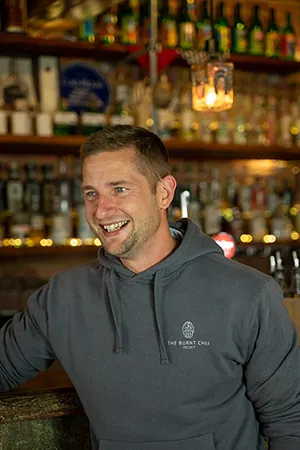The Burnt Chef breaks the silence on mental health
In hospitality, suffering in silence has been a ‘badge of honour’ for too long, says The Burnt Chef project founder Kris Hall. With over 9 years of experience in foodservice wholesale, he’s seen the struggles and mental health issues that this can lead to first-hand. Long, anti-social hours, tough conditions, and continuous pressure take a huge personal toll, which is why he believes it is time to break the silence.

Kris Hall is the founder of The Burnt Chef Project, which works with thousands of people in the UK to raise awareness and start a conversation about mental health and lacking mental hygiene in the workplace, and the industry pressure it creates.
The Burnt Chef Project
The platform raises awareness and strives to be a catalyst for change, Kris explains: “I’ve seen colleagues and friends deal with these issues. Years of these conditions create a hotbed of psychological and psychosocial issues, such as high stress levels, anxiety, depression, and alcohol and drug abuse. Not to mention the impact that the working hours and conditions have on personal relationships with friends and families.”
Self care should be the new ‘badge of pride’, Kris believes: “Every person within hospitality should be able to discuss the state of their mental health and gain support from their peers and employers. It is important that although mental health can’t be seen, it is regularly discussed and policies are reviewed.”
The biggest, invisible issue in the kitchen
In 2017, the NHS reported 1 in 4 Britons will likely suffer from mental health issues during their lifetime. It’s a huge, invisible issue in the UK, but it’s even bigger in hospitality, says Kris: “We have carried out a study among 1,300 foodservice professionals and found a number closer to 4 out of 5. Anti-social hours in excess of 60 per week, little to no natural light, a ‘work hard, play hard’ culture and perhaps less rigid or informed policies on workplace adjustments to mitigate the risk of high-stress environments will do that.”
Staff shortage and the future
Fewer people now see hospitality as a future career. However, before the pandemic, UK Hospitality predicted +3.9% growth in the foodservice industry. Kris is not surprised: “Could you imagine a lawyer or telesales operative start work at 6 am after 3 hours of sleep, then work a 12 – 16-hour shift in a hot, dark environment before repeating the process? Only 35% of our respondents recommended working in hospitality. It is no secret that staff shortages are becoming more common. This, of course, compounds the pressure and stress levels for those who need to fill the gaps…”
What can be done?
The survey conducted by The Burnt Chef only scratches the surface of the impact of mental health issues in hospitality. Change is necessary, believes Kris, and possible: “I do believe that the role of management within hospitality is changing. Their role is to help upskilling staff, so they learn to manage their time better and increase resilience in busy periods, for example. You wouldn’t ask someone to run a marathon without training, so why should we expect staff to walk straight into long services without a similar long-term strategy?”
“Staff shortages are increasing pressure in foodservice”
Managing mental health in your restaurant
3.2 million people work in hospitality in the UK, with the industry employing close to 72 million worldwide. The Burnt Chef Project hopes to become synonymous with change. But that change has to start from the ground up. The industry will be better and stronger for it.
What can you do?
As an employer, you can:
- implement a ‘zero tolerance’ policy towards the mental health stigma and actively promote yourself as ‘employer of choice’;
- offer essential management teams training on raising awareness of mental health or mental health first aid to improve their confidence on the matter and their ability to help and support their teams;
- provide anonymous employee wellness surveys to check in with your staff and actively monitor responses to identify notable changes.
As an employee, you can:
- share the responsibility to lead the charge when it comes to mental health. Senior professionals should feel confident to open up about the topic with their peers without fear of stigma and pushback. This will inspire others who may be struggling to speak up;
- work with employers, as many of them are not well versed on the topic. Sharing valuable insights based on personal experience can help employers improve the working environment.
Most importantly:
open up the conversation, remove the stigma – make space for change.
Practical advice on a better climate for mental health
Improving conditions and creating a better climate for hospitality professionals is more important than ever. Especially now, with post-COVID-19 pressures higher than ever. Tensions are high and good management can make a world of difference for a healthy staff and, in the long run, a healthy business.
“Lead the charge when it comes to mental health!”
- Split hours evenly across teams
- Adopt a zero-tolerance approach to the mental health stigma
- Ensure staff know their rotas and days off at least one week in advance
- Upskill staff to keep their workload even
- Spend time training staff to improve their workload management skills
- Reduce the number of working days to mitigate longer hours
- Offer flexible working hours to those with families and young children
- Reduce fatigue and stress with regular breaks away from the workplace
- Limit split shifts to a minimum
Hungry for more?
In Eat This! Magazine you’ll find the latest trends, inspiration, and expert advice. Download your free copy now!